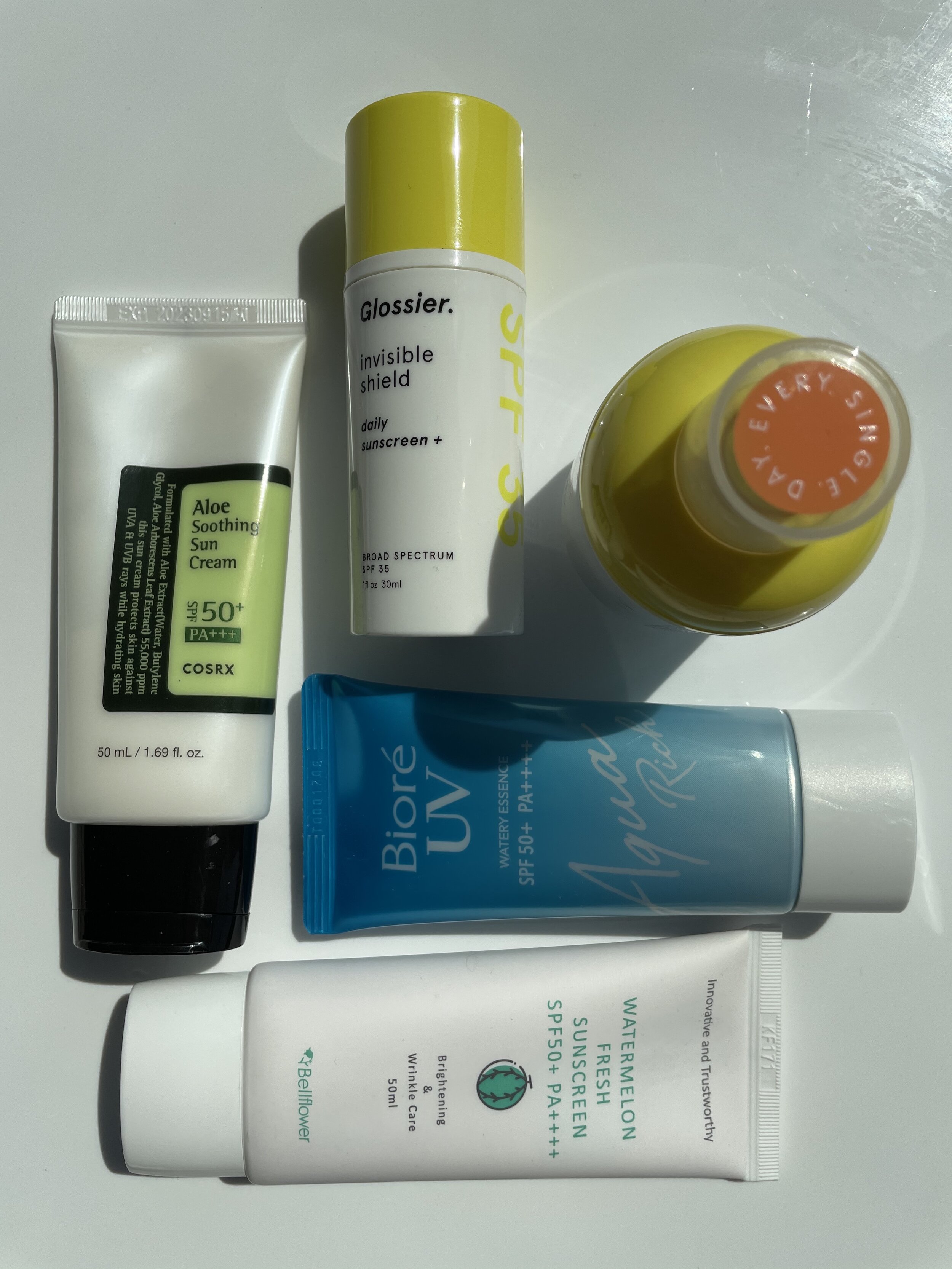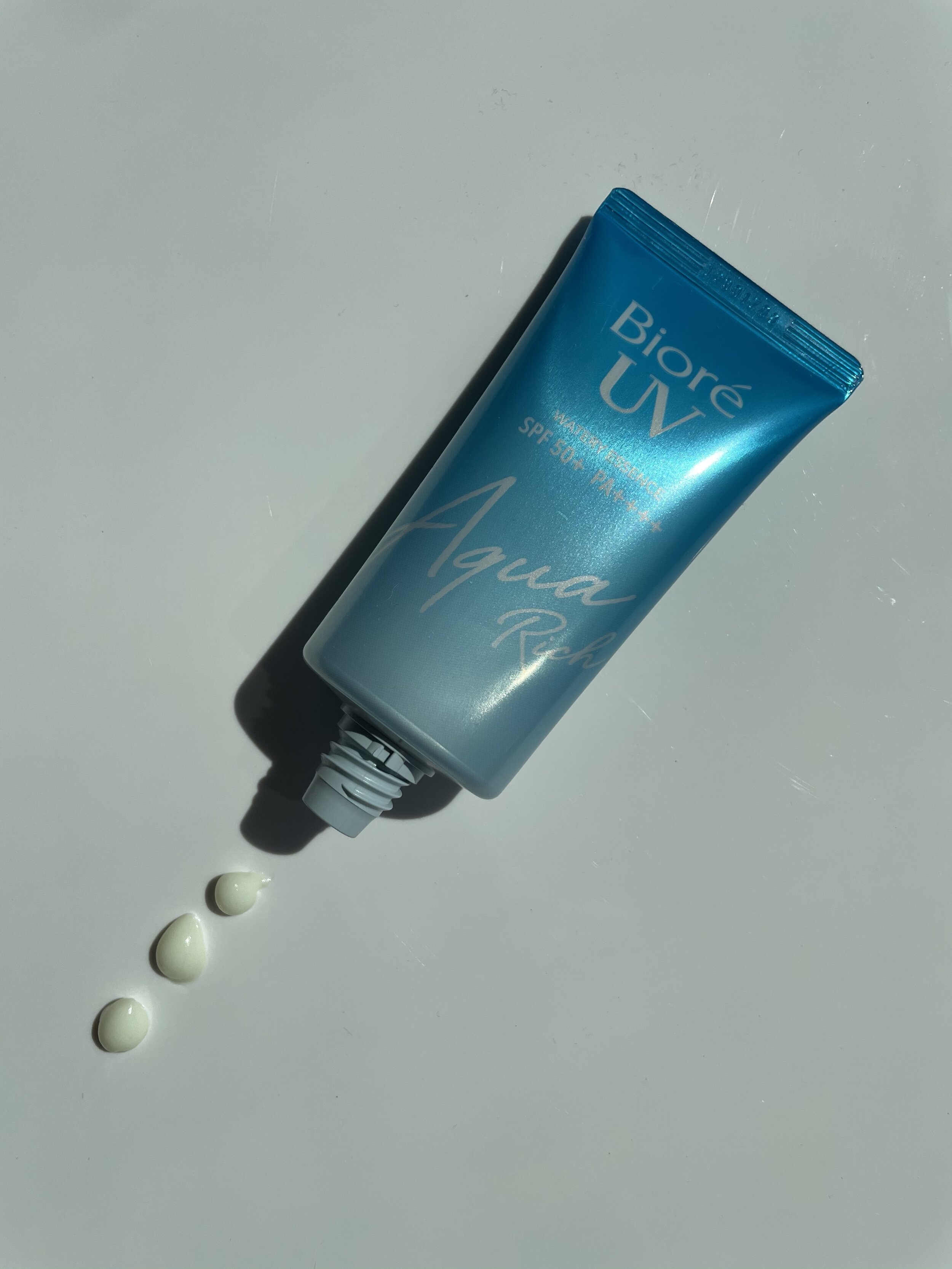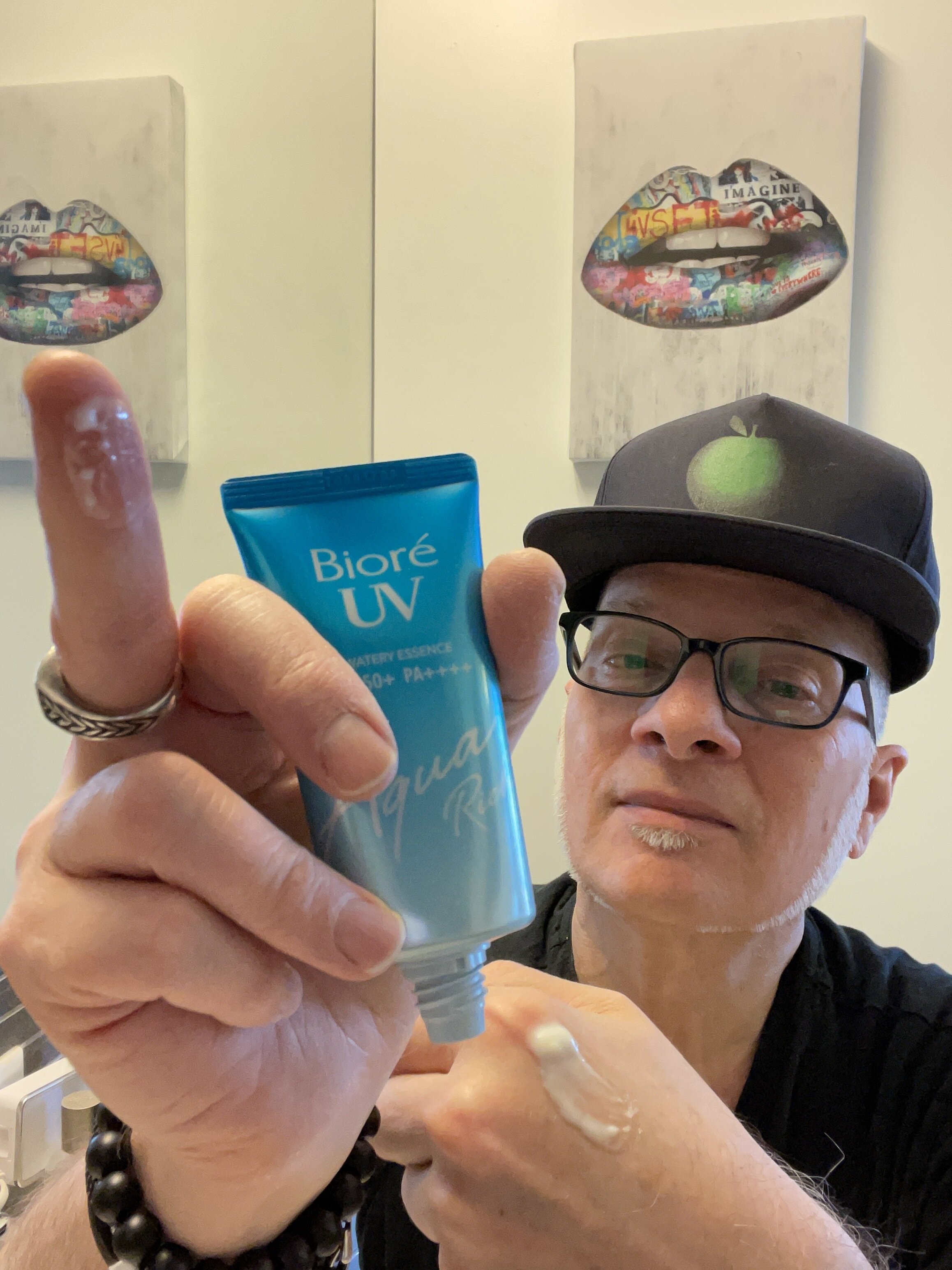PRODUCT REVIEW: BIORE UV AQUA RICH WATERY ESSENCE SPF 50+ PA++++- BEST SUNSCREEN FOR FACE, BEST SUNSCREEN FOR OILY SKIN
BIORE | UV AQUA RICH WATERY ESSENCE SPF 50+ PA++++
This review was originally part of my blog article titled, Super Light Sunscreens I'm Crushing on for Spring: Best Sunscreens for Face, Best Sunscreens for Oily Skin (And All Skin In Spring!) You can catch the full piece here.
—
No matter where I am in the world, no matter the climate, the one product I consider indispensable every day, all year round is sunscreen. It saddens me (it really does!) that so many people only wear sunscreen when it’s sunny out — and very often only in the summer months when the sun is peaking.
That’s just absurd. Sunscreen is vital every day. A simple truth I live by: if you can see the sun, the sun can see you. Sunscreen is the most valuable (make that invaluable!) anti-aging product available to us — every day of the year. Whenever asked for my recommendations for the best anti-aging creams, I always answer sunscreen!
One of my favorite sunscreens of all time is the Skin Aqua Super Moisture Milk from the Japanese personal care conglomerate Rohto. I’ve included it in multiple blog articles, including one of my faves, A Complete $100 Skincare Routine with The Inkey List, The Ordinary, Benton & More! (You can catch it here!)
PRODUCT REVIEW: SKIN AQUA SUPER MOISTURE MILK SPF 50 – ONE OF THE BEST SUNSCREENS FOR OILY SKIN
I’ve joked around about how Skin Aqua’s Super Moisture Milk is so exceptional that I suspect it may be some sort of alien technology that made its way to Earth. It’s just so otherworldly.
What’s important is that you find a sunscreen you love to use so much that you wouldn’t even think of skipping it.
What’s the difference between mineral and chemical sunscreens?
For some real insights, there’s an excellent article by the Paula’s Choice Research Team titled, Mineral vs. Synthetic Sunscreen Ingredients available here. In the piece, the experts explain the differences and benefits between mineral and chemical sunscreens — and even dispel a myth or two:
“The two types of sunscreen ingredients are mineral and synthetic [chemical], and both are equally protective. Further reassuring is that each can be included in formulas created for every skin type. For example, if you have normal to oily skin, there are weightless, non-greasy options; if you have normal to dry skin, it’s possible to find skin-smoothing, hydrating SPF products.
What’s the Difference Between Mineral and Synthetic Sunscreen Ingredients?
The differences aren’t about which type is more effective; rather, it comes down to personal preference and how sensitive your skin is—mineral sunscreens are considered the most gentle options.
Mineral sunscreens: There are only two mineral sunscreen ingredients: titanium dioxideand zinc oxide. They work in skin's uppermost layers to both absorb and, to a lesser extent, deflect and scatter the sun’s harmful rays. These mineral ingredients are sometimes referred to as physical sunscreens or physical blockers, although that’s not a factual representation of how they work.
Synthetic sunscreens: There are over 30 synthetic sunscreen ingredients, all of which absorb into the top layers of skin, where they work similar to mineral sunscreens: by scattering and deflecting the sun’s harmful rays, and by converting UV rays into heat and “deactivating” them. (Don’t worry, you won’t feel a thing.) Common synthetic sunscreen ingredients include oxybenzone, octinoxate, octisalate, and avobenzone. These are sometimes labeled “chemical sunscreens,” which is both misleading and false. All skin care ingredients, even water, are chemicals.
In my days working at Kiehl’s, we had a saying that has always stuck with me:
“It is essential to wear sunscreen even on cloudy seemingly sunless days.”
I believe that to this very day. And I practice it nearly every day. The pandemic has literally upended that ritual, too. I mean there have certainly been days where I’ve not left the apartment and thus don’t have an urgent need for sunscreen. And, over the past several weeks, the weather has been awful here in NYC. So, on days where it’s raining or fog-laden and I’m not going outside, I’ve been giving my skin a rest.
PRODUCT REVIEW: SUPERGOOP! BRIGHT-EYED 100% MINERAL EYE CREAM SPF 40 – BEST ANTI-AGING SUNCSREEN FOR EYES
But, spring is coming, and with it more intense sun rays — and, hopefully, a whole lot more sunny days to enjoy outside. (Not in sandals, of course!) So, it’s about the perfect time to have a look at a few lightweight sunscreens that I’ve been exploring — and really enjoying. Some are new to the market, some are just new to me.
Let’s have a look at one of the five new-to-me super light sunscreens I’m crushing on…
WATCH MY VIDEO REVIEW
COOL CLEAN FACIAL SUNSCREENS TO KEEP US SAFE AND SMILING IN THE SUN!
ON MY YOUTUBE CHANNEL HERE
Biore | UV Aqua Rich Watery Essence SPF 50+ PA++++
Don’t quote me but I think this is the top selling sunscreen in the world. Biore’s UV Aqua Rich Watery Essence is a cult sunscreen from the world of J-Beauty. It’s been dubbed the best sunscreen in all of A-Beauty — with that lightweight silky serum texture that’s so characteristic of Asian sunscreen formulas.
People are obsessed with it. I found a hilarious article on Marie-Claire website titled, I Waited 4 Months for This Japanese Skincare Product to Ship to Me and It's Changed My Life. In the piece, the author, Chloe Metzger, proclaimed that the Biore UV Aqua Rich Watery Essence transformed her complexion — including fading difficult-to-fade acne marks.
“I've now worn the Biore sunscreen every single morning for almost a year, and my skin has truly never looked better. All of my old dark marks and hyperpigmentation from old zits have faded, and my skin tone has evened out. Overall, my face just looks healthier and happier, as if it’s drinking more water, getting decent sleep, and finally calling its mother. Plus, it's completely free of cancer, which is a major plus.”
Sadly, unless you're planning to move overseas soon, you'll have to either stock up Asian sunscreens in bulk, like me, or wait until the FDA approves new sunscreen ingredients. Which, let's be honest, probably won't happen until your face looks wrinkled and leathery on its own. At least there's Amazon, though, amirite?
For the record, I didn’t wait four months to get mine. Thank you, Amazon! Yet, while Amazon can reliably ship a product in a day or two, the site isn’t exactly a reliable source of information. There’s just a single ingredient listed for the Biore UV Aqua Rich Watery Essence: hyaluronic-acid. And a rather cryptic cautionary disclaimer:
【before use】 ● Please do not use people with weak skin especially.
Personally, I don’t think it’s very nice to use people at all. Let alone those with skin weaknesses.
So, analyzing the formula takes a bit more effort than usual and only adds to the mysterious allure of the iconic sunscreen. To start, Biore’s UV Aqua Rich Watery Essence relies entirely on chemical sunscreen filters, full stop. There are four of them, in fact, including Uvinul A Plus, the next-gen sun filter developed to provide very high UVA protection. The sun’s UVA rays are the most insidious — and skin cancer causing.
Biore says its UV Aqua Rich Watery Essence is “powered by the innovative Micro Defense formula to prevent uneven application.” I gotta say, the stuff is quite easily spreadable! I’ve never seen a brand formulate a sunscreen to prevent you from “missing a spot”. You have to appreciate that. Perhaps no one takes sun protection as seriously as the Japanese.
Aside from the slew of chemical filters and the certain UV defense they deliver, there is some pro-skin health goodness in the formula, including humectants Glycerin and Sodium Hyaluronate. And even some nourishing Royal Jelly Extract, the preferred delicacy of Queen Bees everywhere!
What is Uvinul A Plus?
I found the following info on the US distributor’s website:
Uvinul® A Plus Granular is the only photostable organic UVA-I absorber that covers the long wavelengths of the UVA spectrum. It has good solubility in cosmetic oils and also a unique solubility in ethanol. It is compatible with inorganic UV filters like Titanium Dioxide or Zinc Oxide. The outstanding photostability of Uvinul® A Plus Granular provides reliable and efficient sun protection for the whole day.
Sun care products with added anti-aging benefits have a special appeal. Uvinul® A Plus provides not only reliably filters the sun’s dangerous UVA rays, but also provides outstanding protection from free radicals and skin damage. The oil-soluble granular offers excellent formulation flexibility and easily qualifies for EU UVA-PF/SPF recommendation. It is free of preservatives and highly efficient at low concentration. Uvinul® A Plus is ideal for long-lasting sun care and face care products with anti-aging efficacy.
BASF Personal Care offers a wide range of products in various personal care market segments such as Antiperspirant/Deodorants, Body Care, Oral Care, Sun Care, and more. These high-performing products enable the development of formulations that fulfill consumer’s needs.
Features & Benefits of Uvinul® A Plus Granular
Efficient shielding against UVA radiation for prevention of skin damage
Outstanding photo-stability for reliable and long-lasting protection
Excellent formulation flexibility and solubility
Easy achievement of EU recommendation
Does not contain preservatives
Helps to prevent long term skin damage
High efficiency at low concentrations
Interestingly, denatured alcohol is omitted from this iteration of the formula, replaced by a form of alcohol that’s just as drying — ethanol. Alcohol always seems to find its way into J-Beauty skincare formulations. I’m not generally into Japanese skincare for that exact reason. There’s also an ingredient called Polyvinyl Alcohol that I’ve rarely seen in an INCI. It’s popular in those crazy peel-off masks that also happen to peel off your face. Kindly avoid them at all costs.
According to the experts on the Paula’s Choice Research Team, it’s “a synthetic polymer of vinyl alcohol that functions in cosmetics as a gel-based thickener, film-forming, and binding agent. Used quite a bit in peel-off facial masks, this type of alcohol may pose a risk of aggravating skin unless combined with other ingredients that offset this potential, such as glycerin, emollients, or other skin-repairing ingredients.”
I have to admit, the formula’s flaws aside, I haven’t found it drying at all. It’s such a pleasure to use, you almost want to give it a pass…
SHOP THE BLOG: Purchase the Biore UV Aqua Rich Watery Essence SPF 50+ PA++++ for $10.44 here.
A COMPLETE K-BEAUTY ROUTINE WITH THE BEST FACIAL SKINCARE FROM PURITO, COSRX, MISSHA & MORE!
The Ingredient List of the Supergoop! Ultra Daily Dose Vitamin C + SPF 40 Sunscreen Serum PA+++:
 aox|sb, C13-15 Alkane solv|emo, Glycerin
aox|sb, C13-15 Alkane solv|emo, Glycerin  sii|h 0 0, Polyglyceryl-6 Polyricinoleate emu, Polyglyceryl-6 Polyhydroxystearate emu, Octyldodecyl Citrate Crosspolymer h, Niacinamide
sii|h 0 0, Polyglyceryl-6 Polyricinoleate emu, Polyglyceryl-6 Polyhydroxystearate emu, Octyldodecyl Citrate Crosspolymer h, Niacinamide  cci|sb|aacne|h, Phenethyl Benzoate emo|perf, Polyester-25, Silica vc, Terminalia Ferdinandiana Fruit Extract aox|sb, Rosa Centifolia Flower Extract, Jasminum Officinale (Jasmine) Flower Extract perf, Bellis Perennis (Daisy) Flower Extract, Hydrolyzed Sodium Hyaluronate h, Sodium Hyaluronate
cci|sb|aacne|h, Phenethyl Benzoate emo|perf, Polyester-25, Silica vc, Terminalia Ferdinandiana Fruit Extract aox|sb, Rosa Centifolia Flower Extract, Jasminum Officinale (Jasmine) Flower Extract perf, Bellis Perennis (Daisy) Flower Extract, Hydrolyzed Sodium Hyaluronate h, Sodium Hyaluronate  sii|h 0 0, Pseudoalteromonas Ferment Extract
sii|h 0 0, Pseudoalteromonas Ferment Extract  so|h, Glyceryl Caprylate emo|emu, Disteardimonium Hectorite vc, Xanthan Gum vc, Polyglyceryl-2 Isostearate emu, Magnesium Sulfate vc, Sodium Chloride vc, Citric Acid buff, Trisodium Ethylenediamine Disuccinate chel, Sodium Citrate chel|buff, Pentylene Glycol solv|h, Propanediol solv|h, Caprylyl Glycol h|emo, Ethylhexylglycerin pres, Chlorphenesin pres|amic
so|h, Glyceryl Caprylate emo|emu, Disteardimonium Hectorite vc, Xanthan Gum vc, Polyglyceryl-2 Isostearate emu, Magnesium Sulfate vc, Sodium Chloride vc, Citric Acid buff, Trisodium Ethylenediamine Disuccinate chel, Sodium Citrate chel|buff, Pentylene Glycol solv|h, Propanediol solv|h, Caprylyl Glycol h|emo, Ethylhexylglycerin pres, Chlorphenesin pres|amicThe Ingredient List of the Glossier Invisible Shield Daily Sunscreen+ SPF 35:
 aox, Betaine
aox, Betaine  h, Acrylates Copolymer vc, Ammonium Acryloyldimethyltaurate/Vp Copolymer vc, Hydroxyacetophenone aox, Phenoxyethanol pres, Hydrolyzed Wheat Protein/Pvp Crosspolymer, Dibutyl Lauroyl Glutamide vc, Dibutyl Ethylhexanoyl Glutamide vc, Citrus Aurantium Dulcis (Orange) Peel Oil
h, Acrylates Copolymer vc, Ammonium Acryloyldimethyltaurate/Vp Copolymer vc, Hydroxyacetophenone aox, Phenoxyethanol pres, Hydrolyzed Wheat Protein/Pvp Crosspolymer, Dibutyl Lauroyl Glutamide vc, Dibutyl Ethylhexanoyl Glutamide vc, Citrus Aurantium Dulcis (Orange) Peel Oil  perf, Dipotassium Glycyrrhizate
perf, Dipotassium Glycyrrhizate  so|h, Carbomer vc 0 1, Tocopheryl Acetate aox 0 0, Aminomethyl Propanol buff, Butylene Glycol h|solv|vc 0 1, Hippophae Rhamnoides Fruit Extract, Disodium Edta chel|vc, Pentylene Glycol solv|h, Aloe Barbadensis Leaf Extract
so|h, Carbomer vc 0 1, Tocopheryl Acetate aox 0 0, Aminomethyl Propanol buff, Butylene Glycol h|solv|vc 0 1, Hippophae Rhamnoides Fruit Extract, Disodium Edta chel|vc, Pentylene Glycol solv|h, Aloe Barbadensis Leaf Extract  so|emo|h, Silica vc, Bioflavonoids so, Potassium Sorbate pres, Hydroxyphenyl Propamidobenzoic Acid
so|emo|h, Silica vc, Bioflavonoids so, Potassium Sorbate pres, Hydroxyphenyl Propamidobenzoic Acid  so, Brassica Oleracea Italica (Broccoli) Extract, Ethylhexylglycerin pres, Camellia Sinensis Leaf Extract
so, Brassica Oleracea Italica (Broccoli) Extract, Ethylhexylglycerin pres, Camellia Sinensis Leaf Extract  aox|so, Ascorbyl Palmitate
aox|so, Ascorbyl Palmitate  aox 0 2
aox 0 2The Ingredient List of the COSRX Aloe Soothing Sun Cream:
 sii|h 0 0, Propylene Glycol h|solv|vc 0 0, Cyclopentasiloxane emo|solv, Bis-Ethylhexyloxyphenol Methoxyphenyl Triazine
sii|h 0 0, Propylene Glycol h|solv|vc 0 0, Cyclopentasiloxane emo|solv, Bis-Ethylhexyloxyphenol Methoxyphenyl Triazine  sunsc, Phenylbenzimidazole Sulfonic Acid
sunsc, Phenylbenzimidazole Sulfonic Acid  sunsc, Dicaprylyl Carbonate emo, Isoamyl p-Methoxycinnamate sunsc, Potassium Cetyl Phosphate emu|surf, Alcohol
sunsc, Dicaprylyl Carbonate emo, Isoamyl p-Methoxycinnamate sunsc, Potassium Cetyl Phosphate emu|surf, Alcohol  amic|solv|vc, Dimethicone emo 0 1, Glyceryl Stearate emo|emu 0 1-2, Butylene Glycol h|solv|vc 0 1, Titanium Dioxide
amic|solv|vc, Dimethicone emo 0 1, Glyceryl Stearate emo|emu 0 1-2, Butylene Glycol h|solv|vc 0 1, Titanium Dioxide  sunsc|col, C14-22 Alcohols, Polymethyl Methacrylate, Cetearyl Alcohol emo|vc|emu|surf 1 2, PEG-100 Stearate surf|emu 0 0, Triethanolamine buff 0 2, Silica vc, Sodium Hydroxide buff, C12-20 Alkyl Glucoside emu|surf, Dimethicone/Vinyl Dimethicone Crosspolymer vc, Aluminum Hydroxide emo|h|vc, Stearic Acid emo|vc 0 2-3, Fragrance
sunsc|col, C14-22 Alcohols, Polymethyl Methacrylate, Cetearyl Alcohol emo|vc|emu|surf 1 2, PEG-100 Stearate surf|emu 0 0, Triethanolamine buff 0 2, Silica vc, Sodium Hydroxide buff, C12-20 Alkyl Glucoside emu|surf, Dimethicone/Vinyl Dimethicone Crosspolymer vc, Aluminum Hydroxide emo|h|vc, Stearic Acid emo|vc 0 2-3, Fragrance  perf, Caprylyl Glycol h|emo, Phenoxyethanol pres, Acrylates/C10-30 Alkyl Acrylate Crosspolymer vc, Aloe Arborescens Leaf Extract h|so, Dipotassium Glycyrrhizate
perf, Caprylyl Glycol h|emo, Phenoxyethanol pres, Acrylates/C10-30 Alkyl Acrylate Crosspolymer vc, Aloe Arborescens Leaf Extract h|so, Dipotassium Glycyrrhizate  so|h, Carbomer vc 0 1, Xanthan Gum vc, Tocopherol
so|h, Carbomer vc 0 1, Xanthan Gum vc, Tocopherol  aox 0-3 0-3, Amyl Acetate solv, Disodium EDTA chel|vc
aox 0-3 0-3, Amyl Acetate solv, Disodium EDTA chel|vcThe Ingredient List of the Bellflower Watermelon Fresh Sunscreen:
 sii|h 0 0, C12-15 Alkyl Benzoate emo|amic, 1,2-Hexanediol solv, Behenyl Alcohol emo|vc, Diethylamino Hydroxybenzoyl Hexyl Benzoate
sii|h 0 0, C12-15 Alkyl Benzoate emo|amic, 1,2-Hexanediol solv, Behenyl Alcohol emo|vc, Diethylamino Hydroxybenzoyl Hexyl Benzoate  sunsc, Niacinamide
sunsc, Niacinamide  cci|sb|aacne|h, Citrullus Vulgaris (Watermelon) Fruit Extract(11,700 Ppm)
cci|sb|aacne|h, Citrullus Vulgaris (Watermelon) Fruit Extract(11,700 Ppm)  aox, Bis-Ethylhexyloxyphenol Methoxyphenyl Triazine
aox, Bis-Ethylhexyloxyphenol Methoxyphenyl Triazine  sunsc, Polymethyl Methacrylate, Silica vc, Sodium Acrylate/Sodium Acryloyldimethyl Taurate Copolymer vc, Potassium Cetyl Phosphate emu|surf, Polyisobutene vc, Ammonium Acryloyldimethyltaurate/VP Copolymer vc, Centella Asiatica Extract
sunsc, Polymethyl Methacrylate, Silica vc, Sodium Acrylate/Sodium Acryloyldimethyl Taurate Copolymer vc, Potassium Cetyl Phosphate emu|surf, Polyisobutene vc, Ammonium Acryloyldimethyltaurate/VP Copolymer vc, Centella Asiatica Extract  so|aox|h, Caprylyl/Capryl Glucoside surf, Sorbitan Oleate emu 0 3, Adenosine
so|aox|h, Caprylyl/Capryl Glucoside surf, Sorbitan Oleate emu 0 3, Adenosine  cci, Disodium EDTA chel|vc, Ci 77491 col 0 0, Sodium Hyaluronate
cci, Disodium EDTA chel|vc, Ci 77491 col 0 0, Sodium Hyaluronate  sii|h 0 0
sii|h 0 0The Ingredient List of the Biore UV Aqua Rich Watery Essence SPF 50+ PA++++:
 amic|solv|vc, Ethylhexyl Methoxycinnamate sunsc 0 0, Ethylhexyl Triazone
amic|solv|vc, Ethylhexyl Methoxycinnamate sunsc 0 0, Ethylhexyl Triazone  sunsc, Isopropyl Palmitate emo|perf 1 3-4, Lauryl Methacrylate/Sodium Methacrylate Crosspolymer, Diethylamino Hydroxybenzoyl Hexyl Benzoate
sunsc, Isopropyl Palmitate emo|perf 1 3-4, Lauryl Methacrylate/Sodium Methacrylate Crosspolymer, Diethylamino Hydroxybenzoyl Hexyl Benzoate  sunsc, Hydrogenated Polyisobutene emo|vc 2 1, Bisethylhexyloxyphenol Methoxyphenyl Triazine
sunsc, Hydrogenated Polyisobutene emo|vc 2 1, Bisethylhexyloxyphenol Methoxyphenyl Triazine  sunsc, Dextrin Palmitate emu|surf, BG h|solv|vc 0 1, Xylitol
sunsc, Dextrin Palmitate emu|surf, BG h|solv|vc 0 1, Xylitol  h, Acrylates/C10-30 Alkyl Acrylate Crosspolymer vc, Dimethicone emo 0 1, Alkyl Benzoate (C12-15) emo|amic, Glycerin
h, Acrylates/C10-30 Alkyl Acrylate Crosspolymer vc, Dimethicone emo 0 1, Alkyl Benzoate (C12-15) emo|amic, Glycerin  sii|h 0 0, Glyceryl Stearate emo|emu 0 1-2, Propanediol solv|h, Glyceryl Behenate emo|emu, Vinyl Dimethicone/Methicone Silsesquioxane Crosspolymer vc, Cetanol emo|emu|vc|surf 2 2, Agar vc, Sorbitan Distearate emo, Isoceteth-20 emu|surf, Polyvinyl Alcohol vc, Dimethicone/Vinyl Dimethicone Crosspolymer vc, Stearoyl Glutamic Acid surf, Arginine
sii|h 0 0, Glyceryl Stearate emo|emu 0 1-2, Propanediol solv|h, Glyceryl Behenate emo|emu, Vinyl Dimethicone/Methicone Silsesquioxane Crosspolymer vc, Cetanol emo|emu|vc|surf 2 2, Agar vc, Sorbitan Distearate emo, Isoceteth-20 emu|surf, Polyvinyl Alcohol vc, Dimethicone/Vinyl Dimethicone Crosspolymer vc, Stearoyl Glutamic Acid surf, Arginine  sii, Hydroxide K buff, Hydroxide Na buff, Royal Jelly Extract, Na Hyaluronate
sii, Hydroxide K buff, Hydroxide Na buff, Royal Jelly Extract, Na Hyaluronate  sii|h 0 0, Phenoxyethanol pres, EDTA 2Na chel|vc, BHT aox|pres, Fragrance
sii|h 0 0, Phenoxyethanol pres, EDTA 2Na chel|vc, BHT aox|pres, Fragrance  perf
perf
















